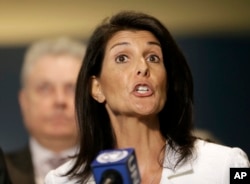U.S. Secretary of State Rex Tillerson said Monday the best step North Korea could take to signal it is ready for dialogue would be to halt its missile tests.
“We've not had an extended period of time where they have not taken some type of provocative action by launching ballistic missiles. So I think that would be the first and strongest signal they could send to us is just stop these missile launches,” Tillerson said.
He spoke from Manila, where he is taking part in the Regional Forum of the Association of Southeast Asian Nations (ASEAN).
Tillerson said Saturday's U.N. Security Council vote unanimously adopting new sanctions against North Korea for its ballistic missile tests sends a message that the entire international community finds the country's actions unacceptable, and that the clear expectation is a denuclearized Korean peninsula.
“We hope again that this ultimately will result in North Korea coming to the conclusion to choose a different pathway, and when the conditions are right then we can sit and have a dialogue around the future of North Korea so that they feel secure and prosper economically,” he said.
North Korea denounced the sanctions Monday in a statement carried by state media, pledging to launch “thousands-fold” revenge on the U.S. and reiterating its stance that sanctions will not force it to negotiate over its nuclear program. North Korea said it will take “action of justice,” without elaborating, and said the U.S. would be making a mistake if it believed its mainland is safe because an ocean separates the two countries.
The White House says President Donald Trump and South Korean President Moon Jae-in committed in a phone call to fully implement all relevant U.N. resolutions related to North Korea and to "urge the international community to do so as well.”
'Grave threat’
The statement late Sunday said Trump and Moon also welcomed the new Security Council resolution and reiterated their belief that North Korea "poses a grave threat" to their countries and Japan.
Trump used Twitter to give his own description of the phone call.
Earlier Sunday, China pressed North Korea to halt its missile and nuclear tests, saying Pyongyang should not “provoke international society's goodwill.”
China delivers warning
Chinese Foreign Minister Wang Yi, in a blunt show of support for new United Nations sanctions against North Korea, delivered Beijing's warning to his North Korean counterpart Ri Yong Ho on the sidelines of the Association of Southeast Asian Nations ministerial meetings in Manila.
The United States cautiously welcomed China's newfound support of sanctions against North Korea, but said that it would closely monitor China's compliance with the penalties intended to deprive North Korea of $1 billion a year to fuel its illicit nuclear and ballistic missile program.
Susan Thornton, the top U.S. diplomat for Asia, told reporters that in the past China, North Korea's economic lifeline, has supported efforts to curb Pyongyang's weapons development, but then slacked off.
“We want to make sure China is continuing to implement fully the sanctions regime,” Thornton said, “not this kind of episodic back and forth that we've seen.”
Trump welcomes support
In a Twitter comment Saturday, Trump welcomed that China and Russia had joined the U.S. in the unanimous U.N. Security Council vote for the sanctions targeting North Korean sales of coal, iron and iron ore, lead and lead ore, and seafood.
“Very big financial impact!” Trump said.
Wang said he advised North Korea to take a “double suspension” approach to easing tensions on the Korean Peninsula, an approach calling for the suspension of North Korea's nuclear tests and the suspension of joint military drills by the U.S. and South Korea.
But Thornton said the U.S. is not considering ending its periodic training exercises with South Korea. She said the U.S. rejects any “moral equivalency” implied in linking the drills with North Korea's nuclear and missile tests. Arms experts say that North Korea's latest intercontinental missile test showed that Pyongyang might be able to strike much of the U.S. mainland.
No comment from North Korea
North Korea's Ri did make any public statements in Manila. However, the ruling party's Rodong Sinmun newspaper said in a commentary that the U.S. had ignored the warning North Korea sent with its missile tests and was pursuing “desperate efforts” with the latest United Nations sanctions.
“Now the U.S. mainland is on the crossroads of life and death,” the commentary warned.
The U.N. sanctions are in response to North Korea's intercontinental ballistic missile launches July 3 and 28. The provisions effectively deny Pyongyang one-third of its annual $3 billion in export revenue.
'Prudent defensive measures’
UN Ambassador Nikki Haley said the U.S. is “taking and will continue to take prudent defensive measures to protect ourselves and our allies” from the threat posed by North Korea, which she said is “rapidly growing more dangerous.”
The resolution also prohibits countries from accepting additional guest workers from North Korea. Pyongyang is notorious for sending its citizens to other countries to work and then confiscating much or all of their salaries, effectively making them slave labor.
The resolution also tightens the enforcement of existing sanctions. The council has imposed several rounds of increasingly tougher targeted sanctions on North Korea since 2006 for its nuclear tests and ballistic missile launches.
In addition to the sanctions, the resolution designates nine North Korean individuals and four entities for asset freezes and travel bans.
Ralph Jennings in Manila and Margaret Besheer at the United Nations contributed to this report.









